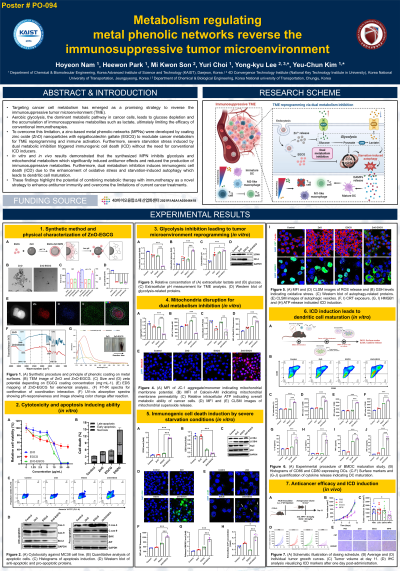Nanomedicine and Nanoscale Delivery (Focus Group - NND)
(398) Metabolism regulating metal phenolic networks reverse the immunosuppressive tumor microenvironment

Introduction: The tumor microenvironment (TME) fosters immune suppression, limiting cancer treatment efficacy. Cancer cells reprogram metabolism, depleting glucose and generating immunosuppressive lactate. Targeting metabolism restores immune function, but metabolic plasticity limits single-pathway inhibition. Immunogenic cell death (ICD) enhances immunity but has limitations. This study develops a zinc-based metal-phenolic network (MPN) of ZnO nanoparticles and EGCG to inhibit glycolysis, disrupt mitochondria, and induce ICD, enhancing immune activation and tumor suppression.
Learning Objectives:
- Describe the role of metabolic reprogramming in tumor immune evasion and therapeutic resistance.
- Demonstrate the dual metabolic inhibition and ICD-inducing effects of metal-phenolic networks.
- Evaluate the potential of MPNs as a combinatorial metabolic-immunotherapeutic strategy for cancer.
In Kang – Graduate student, KAIST; Mi Kwon Son – Researcher, 4D Convergence Technology Institute (National Key Technology Institute in University), Korea National University of Transportation; Heewon Park – Postdoc, KAIST; Yuri Choi – Graduate student, KAIST; Yeu-Chun Kim – Professor, KAIST; Yong-kyu Lee – Professor, Korea National University of Transportation

Hoyeon Nam, PhD (she/her/hers)
Postdoctoral researcher
KAIST
Daejeon, Taejon-jikhalsi, Republic of Korea

